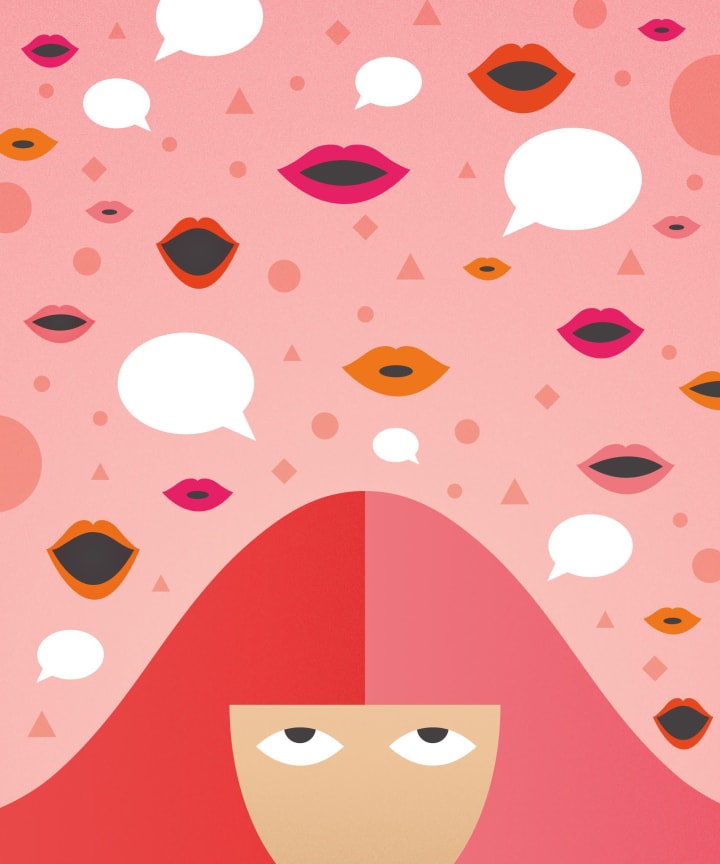Common Myths About Depression
It's time to dispel these common myths about depression before they hurt any more people.

Depression is currently one of the most widespread mental illnesses in the world, and 6.7 percent of the American population will suffer from depression any given year. One would think that people would understand depression, considering how common it really is — but this is clearly not the case.
There are many common myths about depression that continue to circulate throughout pop culture, the internet, and the overall mainstream consciousness. These myths can and have hurt people with depression, and it's about time to set things straight.
The following list is filled with the most common myths about depression you might possibly believe, and the truth about them.
Depressed people constantly look sad and solemn — and anyone else is faking it.

One of the most common myths about depression also happens to be one of the most dangerous. People often assume that depression means that you are constantly crying, upset-looking, and otherwise just miserable in the way you act.
While there are many cases in which people do act upset and depressed all the time when they're suffering from depression, however, most people who are depressed don't always show it. There are literally thousands of suicide cases that involve people who everyone insisted were "genuinely happy people."
If someone says they're depressed, believe them and try to get them the help they need.
You can fix depression with love.

Some people might be depressed because of a love issue, but the truth is that this is not a mental illness that can be cured with love and affection. It's one of the most common myths about depression around, and though rom-coms may have made it seem possible, it's just not true.
Additionally, it's worth pointing out that many abusers also use depression as an excuse to treat partners badly or force partners to stay with them. So, don't believe it if they say you staying can "cure them."
More often than not, there are a variety of factors that are difficult to cure without medical intervention, therapy, and medication. Many forms of depression are also caused by chemical imbalances in the brain, insecurities, and trauma. You can't solve these things with love; you need the help of a professional -— and possibly medicine — to see an improvement.
So, don't try to "fix" someone with depression with your love. It won't work.
Depressed people are all psycho.

While this still ranks highly among common myths about depression, this myth is slowly disappearing from the public's mind. In other words, people are beginning to realize it's bunk.
Psychosis and depression are two totally different aspects of mental illness — and one does not always lead to the other. Psychosis is the term used to describe when you literally see and hear things that aren't there. It's a rift from reality, and in certain cases, can also be associated with incoherent speech, agitation, aggression, and blackouts in memory.
A number of different mental illnesses can have psychosis as a more extreme form of them, including mania, bipolar disorder, depression, Dissociative Identity Disorder, and schizophrenia.
While chemical imbalances can cause someone to get psychosis, not all imbalances are going to be extreme enough to cause this to happen. In fact, it's actually extremely rare among people with depression to become psychotic.
Having depression means you are a risk to yourself and others.

By Petra Collins
Yes, this is also a myth. In fact, it's one of the most common myths about depression — and also is one of the leading causes of mental illness stigma in the States. Depression in itself doesn't mean you're going to end up hurting yourself or others.
Most people with depression do what they can to try to battle it every day. They may try to bottle up the feelings they get, seek therapy, or just "exercise it out."
Even those with suicidal gestures might be doing it as a way to try to relieve themselves of the pain. In fact, studies have shown that many suicidal gestures are actually cries for help.
However, this doesn't mean that you shouldn't get a person help if you believe they are depressed to the point that they are at risk for suicide. Ignoring the warning signs could be a lethal mistake.
It's all in your head.

A lot of people who are depressed tend to be under the impression that it's "all in their head," and may even blame themselves for just "not being happy." Depression is often caused by trauma or chemical imbalances in the brain, which means that, no, it's not in your head.
Moreover, depression doesn't just manifest itself as a gloomy feeling. Living as a depressed personis not easy. People who are depressed are more likely to get aches and pains, feel lethargic, have trouble sleeping, and also get sick.
Depression is a holistic illness, which means that every part of your body will be affected — and that it's definitely not all in your head.
Everyone with depression will experience it the same way.

One of the most common myths about depression out there also happens to be a main reason as to why depression often goes unnoticed. Everyone who gets depressed tends to feel it and express it differently.
For example, some people who are depressed will stop eating because they are too stressed to work up an appetite. Others will stress eat when depression strikes. Most people who are depressed will stop talking to everyone and stay at home while listening to sad music, but some will go to the other extreme and become hyper-social.
Studies have shown that men and women also will show their depression differently. Men are more likely to overwork themselves when they're depressed, while women are more likely to get lethargic. In terms of suicide, women are more likely to attempt suicide, while men are more likely to succeed in their suicide attempts.
The bottom line is that there's no cookie-cutter set of depression symptoms to look for.
Only women get depressed.

For some reason, this is one of the more relatively common myths about depression circulating on the net. Women are, in fact, twice as likely as men to get depression at some point in their lives. However, that doesn't mean that men don't get it, too.
Because it's often seen as a "women's illness," many men will refuse to seek help for it. This often leads to pretty devastating problems for the guys who avoid treatment.
Sadness and depression are the same thing, and people who can't get happy are weak.

By Petra Collins
These two common myths about depression often go hand-in-hand, often to do dismay of those who are coping with depression.
Being sad means that you're upset and filled with sorrow. People who are depressed may feel sorrowful as a symptom, but they're also going to experience other symptoms that aren't just feeling upset. In some cases, they may not even feel sad; it may be a feeling of anxiety, emptiness, or angst.
Unlike depression, sadness is fleeting. For example, sadness would be grieving the loss of a pet for a month, but still being able to handle everything else in life. Being depressed, on the other hand, would be feeling empty and sorrowful without a known cause, only to have it exacerbated by your pet's death.
People who feel depressed aren't weak because they can't "get upbeat" or feel content with themselves. Depression is a serious medical condition that affects every single aspect of your life — and it doesn't discriminate in who it chooses to hurt.
All you need is the right antidepressant to make you feel all better.

Of all the common myths about depression out there, this is sadly the one that doctors are most likely to believe as well. Part of the reason why this is such a common myth is because our society has become obsessed with trying to make everything perfect with the use of various substances.
What most people don't realize is that antidepressants don't always work. Different chemical balances can all cause depression, and psychiatrists can't really tell which chemical is off balance.
In fact, it usually takes around three different medication attempts in order to find a medication that works on a person with depression. In many cases, all attempts fail.
Moreover, just throwing pills at a person will not always make the full problem of depression go away. Talk therapy is almost always needed, as is general holistic care.
If you feel you have depression, it's crucial to take care of your body and work with a doctor who takes an approach that doesn't only rely on medication. After all, it's a condition that affects your entire body, so why wouldn't you treat every part of your body to cure it?
About the Creator
Rowan Marley
Rowan Marley is a 20-year-old sports enthusiast who hails from Brooklyn. When he's not hitting up a local Zumba class, he's drinking organic smoothies. That's just how he rolls.







Comments
There are no comments for this story
Be the first to respond and start the conversation.